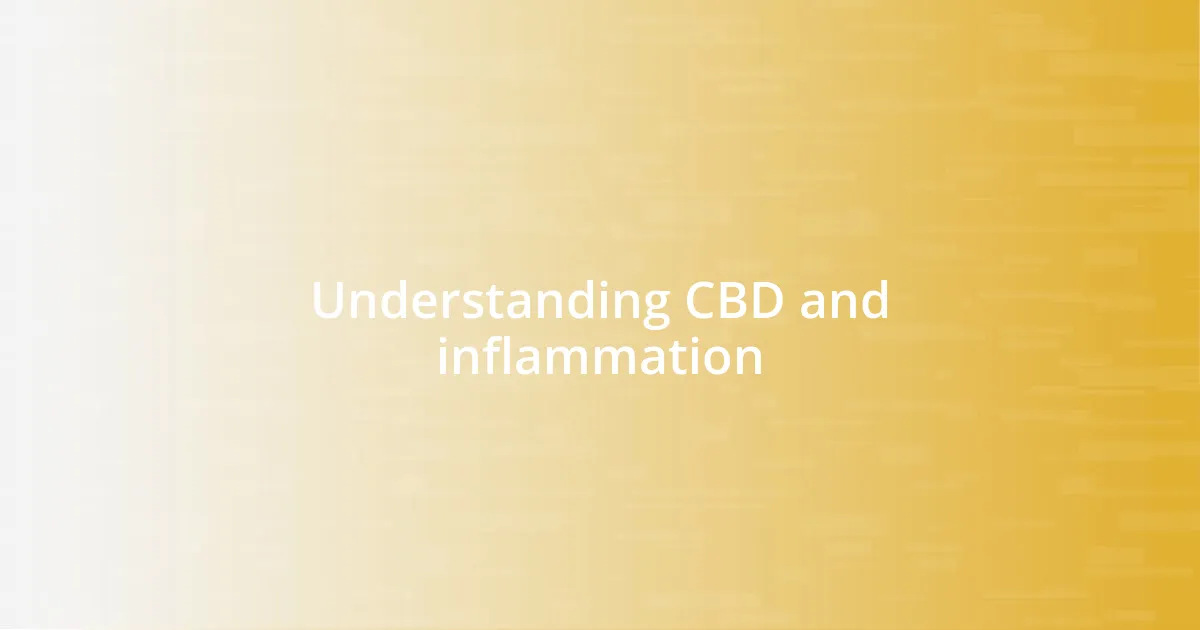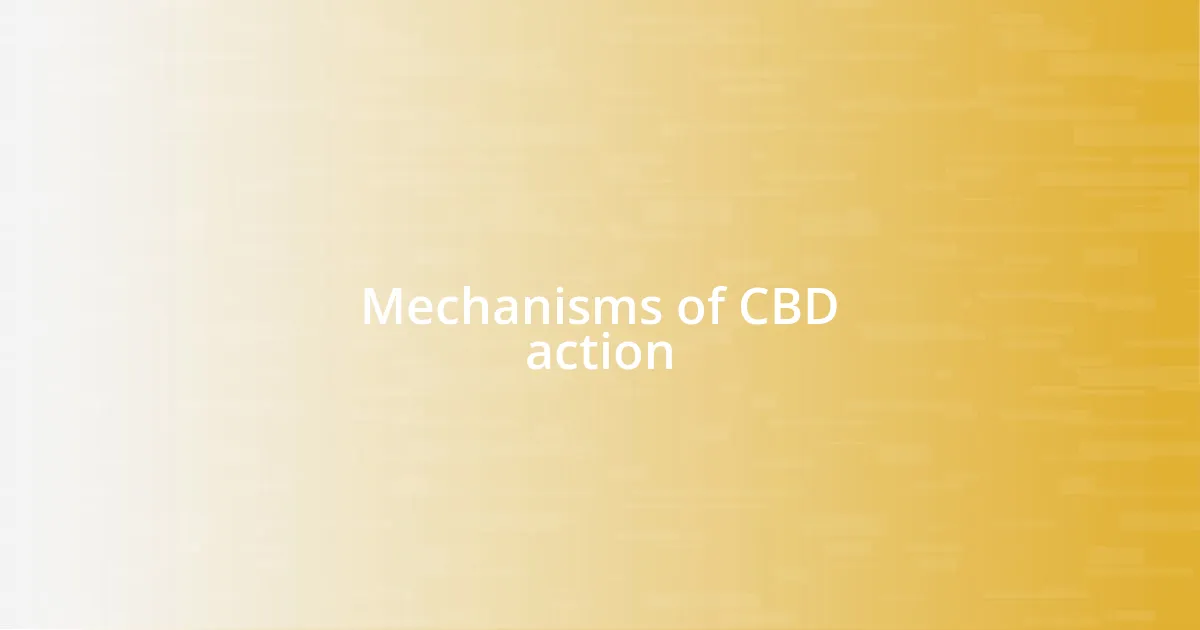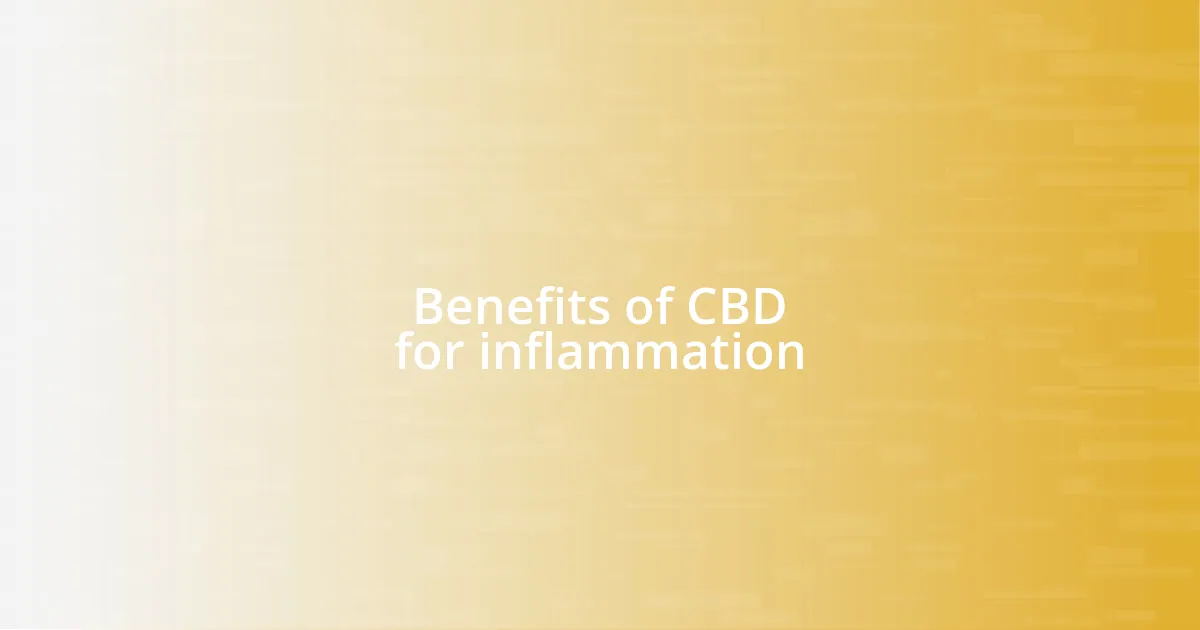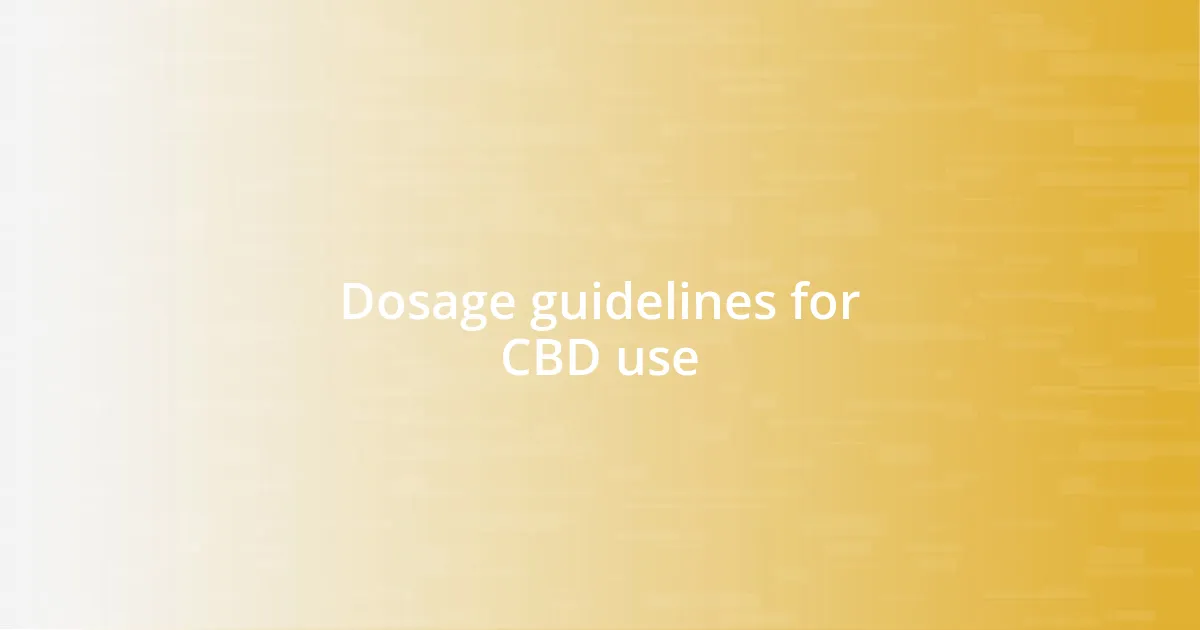Key takeaways:
- CBD (cannabidiol) is a natural compound with potential anti-inflammatory effects, beneficial for those experiencing chronic inflammation.
- It interacts with the endocannabinoid system, primarily binding to CB1 and CB2 receptors, which helps regulate pain perception and immune response.
- Users report various benefits from CBD, including natural relief from pain, improved quality of life, and fewer side effects compared to traditional medications.
- Personalized dosage is crucial, as it varies by individual and can impact effectiveness; common guidelines suggest starting between 5 mg and 50 mg based on specific needs.

Understanding CBD and inflammation
CBD, or cannabidiol, is a compound derived from the cannabis plant, known for its potential anti-inflammatory properties. From my own experience, I’ve found that CBD can help to alleviate the discomfort associated with inflammation. Have you ever tried over-the-counter medications that just didn’t cut it? It’s a frustrating cycle, but CBD seems to offer a more natural alternative that many are beginning to explore.
Inflammation is the body’s response to injury or irritation, and while it’s a natural defense mechanism, chronic inflammation can lead to ongoing health issues. Personally, when I was dealing with persistent joint pain, incorporating CBD into my routine provided a noticeable difference—almost like my body was saying, “Thank you!” It’s fascinating how cannabinoid receptors in our bodies may interact with these compounds, potentially reducing the inflammatory response.
Moreover, there’s a growing body of research suggesting that CBD may modulate immune responses, which could further explain its effectiveness. Isn’t it incredible to think that such a simple compound may hold the key to better managing inflammation? I often wonder how many people are unaware of the benefits, simply stuck in a cycle of other, harsher remedies. Sharing my journey has opened conversations about CBD’s potential, and it’s inspiring to see others considering this natural approach for their inflammation issues.

Mechanisms of CBD action
CBD interacts with the endocannabinoid system to alleviate inflammation, a network of receptors spread throughout our bodies. Personally, I was amazed to discover that CBD primarily binds with two receptors: CB1 and CB2. While CB1 receptors are mainly found in the brain, influencing pain perception and mood, CB2 receptors sit predominantly in the immune system—perfectly positioned to help regulate inflammation. This connection has left me pondering the vast potential CBD has in reshaping how we view treatment for inflammatory conditions.
In my experience, one of the standout mechanisms of CBD action is its ability to inhibit pro-inflammatory cytokines. These are signaling molecules that play a crucial role in the inflammatory response, and by limiting their production, CBD can significantly lower inflammation levels. I remember being skeptical at first, but after integrating CBD into my daily wellness routine, the difference was palpable. Suddenly, everyday activities didn’t come with the usual discomfort, and that was a game-changer for me.
There’s also evidence suggesting that CBD may reduce oxidative stress, which is often linked to chronic inflammation. Reflecting on my journey with physical challenges, the realization that CBD could support a healthier inflammatory response was enlightening. I’ve even had friends reach out to share their own positive experiences with CBD, reinforcing the idea that these mechanisms might be not just theoretical but very much applicable to real-life scenarios.
| Mechanism | Description |
|---|---|
| Endocannabinoid System Interaction | CBD binds primarily to CB1 and CB2 receptors, affecting pain perception and immune response. |
| Inhibition of Pro-inflammatory Cytokines | Reduces the production of signaling molecules that promote inflammation. |
| Reduction of Oxidative Stress | Helps lower oxidative damage, contributing to inflammation relief. |

Benefits of CBD for inflammation
CBD for inflammation offers a wealth of benefits that I’ve personally experienced and observed in others. One of the most significant advantages is its potential to provide relief without the harsh side effects often associated with traditional pain medications. I recall a friend who used to rely on prescription drugs for her chronic back pain. After trying CBD, she shared with me how she felt a rejuvenated sense of freedom—not just from pain, but from the medication’s foggy side effects. That transformation speaks to the gentle yet effective nature of CBD.
Here are some notable benefits of CBD for inflammation:
- Natural Relief: CBD provides an alternative to over-the-counter medications, reducing reliance on pharmaceuticals.
- Improved Quality of Life: Many users report enhanced daily functioning and reduced discomfort.
- Well-tolerated: CBD generally has fewer side effects compared to traditional anti-inflammatory drugs.
- Holistic Approach: It addresses inflammation at the source, promoting overall well-being and balance in the body.
- Accessibility: With its growing popularity, CBD products are becoming increasingly available and varied, catering to different preferences.
The joy of hearing others share positive outcomes after integrating CBD into their routines resonates with me deeply. It’s a reminder of how exploring natural remedies can lead to impactful changes in our lives.

Choosing the right CBD product
Choosing the right CBD product can be a bit overwhelming given the numerous options on the market. From oils and tinctures to gummies and topicals, each product type serves different needs. I remember standing in a store, staring at the shelves, wondering which form would work best for my inflammation. It really made me realize how crucial it is to understand my own needs and preferences before making a choice.
When I first started exploring CBD, I found full-spectrum products to be particularly effective for inflammation. These products contain a range of cannabinoids, terpenes, and other beneficial compounds that can boost the overall effects through something called the “entourage effect.” Personally, the first time I tried a full-spectrum oil, I noticed a significant difference in my relief level compared to isolate products. It was a testament to how the combination of substances can enhance the therapeutic potential.
One key consideration is the product’s potency. I’ve learned through trial and error that starting with a lower dose and gradually increasing it is a wise approach. For example, after beginning with a low-potency tincture, I eventually transitioned to a stronger one that better suited my needs. Have you ever experienced that “aha” moment when something finally clicks? Finding the right potency can be just that—transformative. Always check third-party lab testing to ensure quality and confirm that you’re getting exactly what you think you are.

Dosage guidelines for CBD use
Determining the right dosage of CBD can feel like a journey, as it varies widely from person to person. When I first began using CBD, I started at about 10 mg a day, which some experts suggest as a baseline for beginners. Reflecting on those early days, I recall feeling a bit apprehensive to increase my dose; it took some time to figure out what truly worked for me. Many people might wonder how long it takes to feel the effects—typically, it’s around 30 minutes to two hours. This variability can really throw you, can’t it?
As I adjusted my dosage, I learned that smaller, consistent doses tend to yield better results over time than a large dose taken all at once. This was a real game-changer for me. I remember trying a higher dose in one go and quickly realizing I felt more anxious than relaxed, which led me to reassess my approach. Personalizing the experience became key. Noting your own body’s responses and maintaining a journal can help you track what dosage feels best, giving you a sense of control and clarity.
It’s also important to consider that especially for inflammation, some suggest dosage guidelines ranging from 5 mg to 50 mg, depending on your specific needs and body weight. I’ve chatted with friends who have divergent experiences; some swear by higher doses, while others find relief in much lower quantities. The beauty of CBD is its ability to be tailored to individual requirements, making the process of finding the right dosage a personal exploration rather than a one-size-fits-all solution. Have you found yourself in a similar position? Understanding this aspect truly opened my eyes to the potential of CBD.

Potential side effects of CBD
Certain side effects can accompany CBD use, and it’s essential to be aware of them. For example, when I first tried CBD, I felt a bit lightheaded, which caught me off guard. I wasn’t expecting that sensation, and it made me question whether I was using the right dosage or product. Have you ever had a surprising reaction to something new? It’s moments like these that highlight the importance of closely monitoring your body’s responses.
Another common side effect I encountered was dry mouth, often described as “cottonmouth.” It’s funny how something so seemingly minor can become distracting. I would find myself reaching for a glass of water more frequently, especially during the first few days of use. It’s a good reminder that even minor side effects can alter your experience, prompting you to stay mindful of hydration while exploring CBD.
Finally, I’ve learned that some users may experience drowsiness, particularly with higher doses. I remember one night after increasing my intake a bit too much; I felt an overwhelming wave of fatigue wash over me. Have you ever had a day where you just couldn’t stay awake? While it’s a positive for some—especially those seeking relief from insomnia—it can be counterproductive if you need to stay alert. Therefore, finding a balance is crucial.















